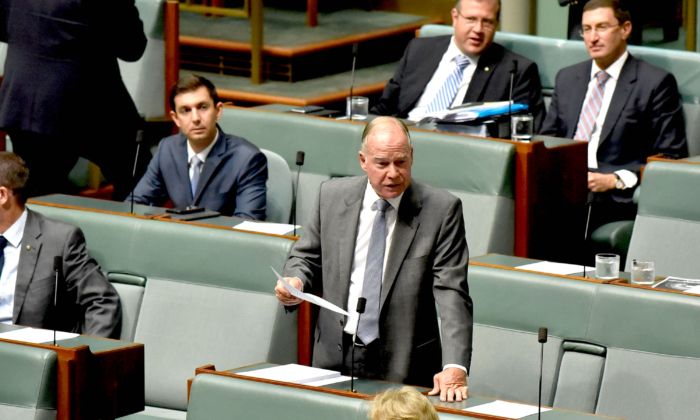Former Liberal MP Achieves 10% in Initial Effort, Unwavering in Opposition to Mandates and Net Zero Policies
Russell Broadbent departed from the Coalition in protest against the support for COVID mandates.
Former Liberal MP turned independent, Russell Broadbent, expresses no regrets about his separation from the Liberal Party, despite losing his seat in Monash, which encompasses eastern Victoria.
New Liberal candidate Mary Aldred seems poised to secure the Lower House seat by the weekend, amassing 28,138 votes, outpacing the closest Labor candidate, Tully Fletcher, who received 17,809 votes.
Broadbent achieved 10.1 percent of the total vote in his inaugural run as an independent.
The former draper and small business owner held his seat for 25 years before leaving the Liberals in November 2023.
He cited the federal government’s COVID-19 vaccination mandates during the pandemic years as the catalyst for his decision to break away and campaign independently.
In an interview with The Epoch Times during a post-election gathering in Drouin, Broadbent expressed confidence in his choice.
“The entire response to COVID over the last four years, along with how others have reacted differently, reflects my stance on COVID,” he stated when asked which policies resonated with constituents.
“I wouldn’t retract a single word. I actively challenged the narrative. … They [Liberal Party] likely grew weary of my stance on COVID.”
Former Liberal senator Gerard Rennick also distanced himself from the center-right party, running separately due to the party’s support for COVID-19 lockdowns.
Liberal Party Should Have Opposed Net Zero
Broadbent cautioned that the net zero energy policy endorsed by both the victorious Albanese Labor government and the Liberal Party could “destroy the country.”
Former Prime Minister Scott Morrison and then-Energy Minister Angus Taylor had committed to achieving net zero by 2050.
During its first term, the Albanese government has funded numerous net zero projects and plans to continue this trend.
Broadbent has vocally criticized the bipartisan support for this policy, believing that the phased closure of coal-production facilities will lead to significant economic distress.
“The government hasn’t adequately prepared our economy. Labor has made decisions in recent budgets that hinder the economy’s functionality amidst international challenges,” he said.
He added that the Liberal Party failed to take a stand against Labor on this issue.
“They [Liberal Party] did not set themselves apart by opposing net zero,” Broadbent remarked.
Many constituents have shared their concerns with Broadbent regarding soaring energy bills, which he attributes to the energy transition.
The net zero initiative has pressured both state and federal governments to compel major energy producers to shut down coal-fired power plants and pivot towards renewable energy sources.
However, this transition incurs costs for homeowners, as it limits energy supply (leading to rising prices) and requires a substantial initial investment in renewable projects, prompting governments to offer taxpayer-funded subsidies.
“Many people, not just here but everywhere, constantly talk about electricity prices,” Broadbent said.
“And as more renewables are introduced, electricity prices will continue to rise.”





